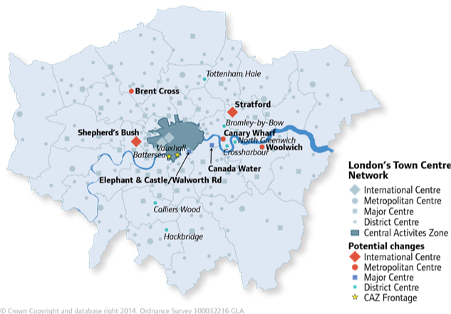Change is in London’s DNA. The city evolves on an almost daily basis. But just like the Thames, the constituent parts ebb and flow at different rates in response to a plethora of drivers, including economic flux, immigration, social advancement and technological development.
This change within geographically-defined neighbourhoods creates opportunities for individuals, communities and commercial organisations and has been turbo charged by COVID.

There are over 200 town centres in London.
Hasn't COVID-19 put pay to some of the projections of continual growth; and changed our perception of what is important in driving change?
London was hit hard by the virus, and early in comparison to the rest of the UK. Critically it also highlighted social divisions within the London boroughs, with a seemingly direct correlation between mortality rates and deprivation. The London Intelligence report from May this year noting “…the age-standardised mortality rate from COVID-19 was twice as high in the 20% most deprived areas in England than in the 20% least deprived”. We are all questioning future priorities.
Can future development in London’s town centres help?
Town centres are recognised as places where social divisions could be broken down, the Mayor of London’s ‘High Streets for All’ report acknowledging the important social function, offering “employment for marginalised Londoners” and “promoting community and cultural exchange”.
Through innovative design, and a more flexible approach to uses London’s town centres can be at the forefront of driving regeneration and addressing more of the social inequality.
Isn’t everybody moving to the sticks?
The immediate talk maybe of exodus, of less and longer commutes but the trends driving urbanisation are unlikely to change, with a growing population and a need for supporting infrastructure; and whilst any particular London location (defined by its own set of infrastructural, environmental, cultural and socio-economic influences), will be on its own timeline for recovery, that recovery will happen.
With each step along that timeline, new opportunities and challenges emerge; with the biggest immediate questions around the future of retail and offices, but equally about the quantity and nature of development that we deliver in our town centres. To help address rather than drive inequality.
At Montagu Evans we have been working across London on major regeneration, and what a mix of uses and type of development will deliver the best economic and social outcomes for our clients.

What is the opportunity for London's town centres?
Never has the local environment felt more important, people are engaging within their communities more than ever, and the role of the town centre is vital.
The opportunity is to embrace all the changes; and for our clients, both public and private sector, the prize will be in the delivery of projects and profits.
More than this though, getting it right will see an improvement in our social as well as physical infrastructure. With the benefits of development in one area being felt much further afield and help address the inequality issues in the city.
The path will be challenging, and we will need to embrace new thinking, but successful local authorities and developers have a generational opportunity to embrace some those challenges to help drive positive change as well as commercial returns.


/Passle/5c9a06f6989b6e10ec2d3265/MediaLibrary/Images/2024-04-19-09-36-48-517-66223b30d15f73709e80efe1.jpg)